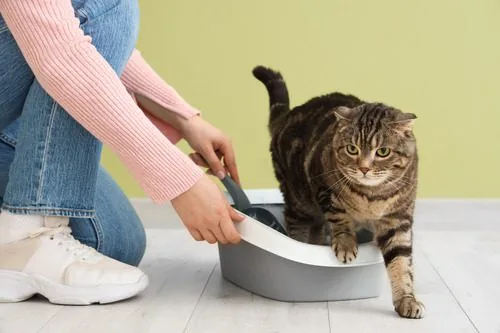
Our Veterinary Blog
Why Your Cat Is Pooping Outside of the Litter Box
It can be frustrating to come home and discover your cat has decided the floor, couch, or even your favorite rug is now their preferred bathroom spot. As pet lovers ourselves, we know cats are usually clean and routine-driven, so when they start pooping outside the litter box, it can leave you feeling confused and overwhelmed. While this behavior might seem like your cat is misbehaving, it’s often their way of telling you something’s not quite right. At Lakeland Animal Clinic, we can help you uncover the possible reasons behind this behavior and offer solutions to restore harmony in your home.

Common Reasons for Cats Pooping Outside the Litterbox
If your cat is pooping outside the litter box, the first step is identifying potential causes. Cats are creatures of habit, and changes in their routine or environment can often disrupt their behavior. Here are some of the most common reasons for litter box avoidance:
Litter Box Cleanliness
Cats are extremely particular about cleanliness. A dirty litter box can quickly deter your cat from using it. If waste isn’t removed regularly, the odor or the feel of the litter can become unpleasant for your feline friend. Even if the litter box looks clean to you, your cat’s heightened senses might say otherwise. To address this issue:
- Scoop the litter box at least once a day.
- Clean the box thoroughly with mild soap and water once a week.
- Ensure the litter box is free of strong cleaning product odors, which can repel cats.
Medical Issues
Health problems often lead to changes in a cat’s bathroom habits. If your cat is pooping outside the litter box, they could be dealing with constipation, diarrhea, or even pain associated with the act of defecation. Gastrointestinal discomfort or conditions like inflammatory bowel disease (IBD) might make the litter box an uncomfortable place. In such cases, it’s essential to consult your veterinarian for a proper diagnosis. Lakeland Animal Clinic is here to help. Call us at (863) 688-3338 to schedule an appointment if you suspect your cat’s behavior is health-related.
Stress or Anxiety
Cats are sensitive to their surroundings, and stress can significantly impact their behavior. Major changes such as moving to a new home, introducing a new pet, or even a change in your work schedule can upset your cat’s routine. This emotional distress may result in your cat pooping outside the litter box as a way to communicate their discomfort. Signs of stress in cats may include:
- Hiding or avoiding interaction
- Excessive grooming or scratching
- Changes in appetite or sleep patterns
Litter Box Location
The placement of the litter box plays a vital role in whether or not your cat feels comfortable using it. If the box is located in a high-traffic area, near loud appliances, or in a spot that feels unsafe to your cat, they might avoid it entirely. To ensure the location meets your cat’s preferences:
- Choose a quiet, low-traffic area.
- Avoid placing the litter box near your cat’s food and water.
- If you have multiple cats, provide at least one litter box per cat, plus one extra.
The Role of Litter Type in Litter Box Avoidance
The type of litter you use can also be a dealbreaker for your cat. Cats can be surprisingly picky about the texture, scent, and depth of litter. If your cat is pooping outside the litter box, it might be worth experimenting with different types of litter to find one they prefer.
Scented vs. Unscented Litter
While scented litter may smell pleasant to you, your cat might find it overpowering or off-putting. Many cats prefer unscented litter because it feels more natural and less intrusive.
Texture Preferences
Some cats prefer fine, sand-like litter, while others might like larger granules. If you’ve recently switched to a new type of litter, your cat’s behavior could be their way of expressing dissatisfaction.
Litter Depth
Cats generally prefer a moderate amount of litter. Too little litter might not allow them to bury their waste properly, while too much might make the box difficult to navigate.
How to Encourage Your Cat to Use the Litter Box Again
If your cat has started pooping outside the litter box, it’s important to take proactive steps to redirect their behavior. With patience and consistency, you can encourage them to return to their usual routine.
Evaluate the Litter Box Setup
Start by assessing the basics:
- Is the litter box clean?
- Is it placed in a quiet, private location?
- Are there enough litter boxes for the number of cats in your household?
Make adjustments as needed, and give your cat time to adjust to any changes.
Observe Your Cat’s Behavior
Pay close attention to when and where your cat is pooping outside the litter box. Patterns in their behavior can offer clues about the underlying cause. For example:
- Is it happening during stressful events, such as visitors in the home?
- Does it occur at a specific time of day or in a certain location?
Use Positive Reinforcement
Reward your cat with praise or a treat when they use the litter box correctly. Avoid punishing them for accidents, as this can increase anxiety and worsen the issue. Positive reinforcement helps establish a sense of trust and encourages good habits.
When Should You Seek Veterinary Advice?
In some cases, even the most diligent efforts to resolve litter box issues at home might not yield results. Persistent litter box avoidance could indicate an underlying medical or behavioral problem that requires professional attention. At Lakeland Animal Clinic, our veterinary team can help identify the cause and create a tailored plan to address your cat’s needs. If your cat is pooping outside the litter box and you’re unsure what steps to take next, give us a call at (863) 688-3338. We’re here to provide guidance and support.
Encouraging Long-Term Healthy Habits for Your Cat
By maintaining a clean and inviting litter box, addressing stressors in your cat’s life, and seeking professional advice when necessary, you can help your feline companion feel secure and comfortable. If you have questions about your cat’s behavior or need assistance, reach out to Lakeland Animal Clinic at (863) 688-3338. Together, we can help your cat return to their healthy, happy routine.
Recent Posts
About Us
Family is family, whether it has two legs or four. At Lakeland Animal Clinic, we've spent the last 40 years healing and caring for your pets. As a family-operated practice, we know that family is about more than simply being related. Animals give us the ability to develop strong bonds and feel great compassion for a fellow living creature.
